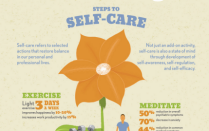Self-Care Exercises and Activities
The activities and exercises listed below are intended to augment your self-care plan or can be used independently.
The topics cover ways to maintain your physical health, decrease stress, increase relaxation and equanimity, and deal with challenging emotional situations (including work situations). We invite you to find the ones that are applicable to your life and situation.
We also recommend that you read Developing Your Support System for information on nurturing your relationships and enhancing your social support network and look through the Inspirational Materials and Self-Care Readings pages for resources you can use to enhance your spiritual, emotional, and intellectual well-being.
On this page:
Healthy Eating

One important way to maintain and enhance your physical health is through healthy eating. The USDA's Center for Nutrition Policy and Promotion has prepared recommendations based on the most current research to help you evaluate and improve your food choices. Check out the Dietary Guidelines for Americans website's current dietary guidelines.
Physical Fitness and Immunity

Getting regular physical exercise and taking steps to protect yourself from contracting colds and flu bugs are fundamental aspects of self-care. Tips for Increasing Physical Activity includes ideas for boosting your overall level of physical activity as well as incorporating exercise into your daily routine. Strengthen Your Immune System offers pointers to keep your immune system strong and your body healthy.
Reducing Stress
There are many ways to begin reducing your stress and some of them only take a few moments. Look over the suggestions in Some Simple Ways to Relieve Stress to see if there is something you can do right now (and do it!) and also make a note of the other activities you can incorporate into your daily life from now on. For specific suggestions on how to lower stress while you are at work try 21 Ways to Reduce Stress During the Workday.
Another technique that some people employ to deal with their stress is to try to understand and address the factors that contribute to it. Practicing Stress Journaling can be useful in this regard.
Time Management

One of the most common complaints associated with feelings of stress is, “There isn't enough time!” Use the tips provided in Time Management to help you prioritize and schedule your time, set goals, and end procrastination.
Relaxation
Learning how to relax is vital for self-care. Fortunately there are a number of well-developed techniques you can use. Step-by-step instructions on how to use progressive muscle relaxation and visual imagery to ease tension and increase relaxation are included in Effective Methods for Relaxation. For other ways to achieve (or return to) a more peaceful state, check out the exercises described in Energy Management For Care Providers and Creating Your Special Place. Additional techniques you might consider are yoga, Tai Chi, and massage – for online resources and local practitioners consult the Online and Other Self-Care Resources webpage.
Mindfulness

When we feel stressed and overburdened, it can often seem like we’re living on “autopilot,” disconnected from the here-and-now and our present experience. One remedy for this is mindfulness, which involves direct and nonjudgmental awareness of the present moment. You may have heard of mindfulness as a form of meditation, but it can also be a general orientation to your own experience. “When you are mindful, you are awake to life on its terms – fully alive to each moment as it arrives, as it is, and as it ends” (Sanderson, nd). For an introduction to how you can become more mindful, read through Mindfulness and learn mindful breathing. As with many of the materials listed in this section, these materials may be helpful for your clients as well.
Avoiding Compassion Fatigue
Compassion fatigue can develop from a combination of burnout (feelings of hopelessness and difficulties at work or in doing your job effectively) and secondary or vicarious traumatization (from exposure to the traumatic life experiences that your clients report). Check out Ways to Avoid Compassion Fatigue for key elements to enhance your resilience in the workplace.
Assertiveness
Learning to be assertive (rather than unassertive or aggressive) is a tremendously important skill for your emotional well-being – one that can positively impact your life both personally and professionally. Assertiveness enables direct and honest communication and important boundary setting, and it can address some of the situations that add to feelings of stress. Read over Assertiveness and Nonassertiveness to begin to learn and practice the skills.
Be Good to Yourself
Much of what we have described in these Student Self-Care webpages (and more), is summed up on a handy single page, Tips for Vitality and Serenity. Check it out (and keep it handy), and be good to yourself!
